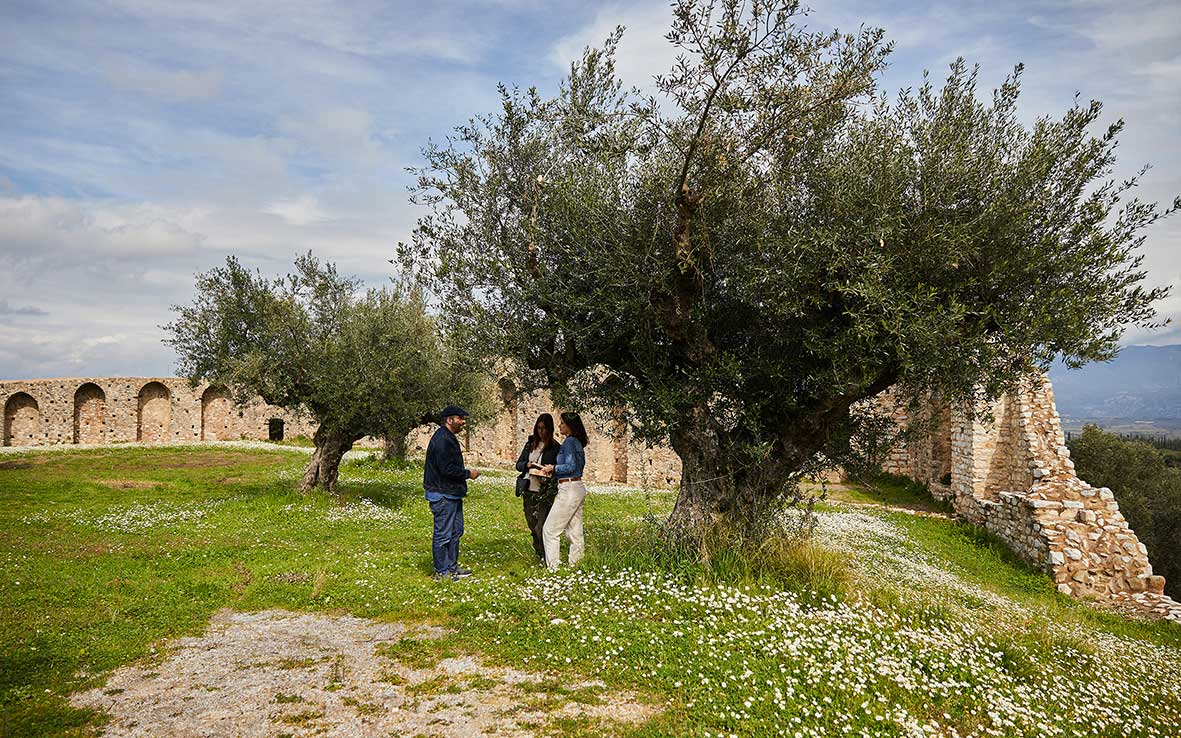The term “olive tourism” was first used in Spain in 2002 to describe the totality of travel experiences relating to the olive and to olive oil. In Greece, the first steps were taken around fifteen years ago and were centered around the olive harvest. Today, the notion of olive tourism covers everything from visits to olive presses and olive oil tasting sessions to spa treatments using olive-based products. The recent initiative by the Tourism Ministry to introduce a quality mark and standards for olive presses which are open to the public formalizes the development of a promising new sector that’s following in the successful steps of wine tourism.
Dimitra Mathiopoulou of The Olive Routes is a tourism professional who understands the value of broadening the travel experience beyond a simple visit to a press. The guided tours around the modern Kontopoulos olive press in Androussa in Messenia are complemented by tasting sessions for olive oil and olives at the family’s old olive press. Visiting the two facilities, the visitor can appreciate the technological evolution from stone presses to the modern equipment used for cold pressing.
Info
The Olive Routes, Androussa, Messenia, Tel. (+30) 693.710.1215, theoliveroutes.com
Addressing a mainly foreign audience, Dimitra also organizes treasure hunts in nearby Androussa Castle. Glass olive oil bottles contain riddles which lead the visitor to the discovery of the features of Greek olive oil and the history of the area. In the shadow of the castle built by the Villehardouins in the 13th century, an idyllic landscape of olive and cypress trees – not unlike Tuscany – stretches out to the sea. Our walk continues to a neighboring olive grove with 120 ancient trees, the oldest of which are 1,500 years old. Dimitra demonstrates a rule of thumb for estimating the age of a tree: a trunk we can completely encircle with our arms belongs to a tree that’s roughly 150 years old.
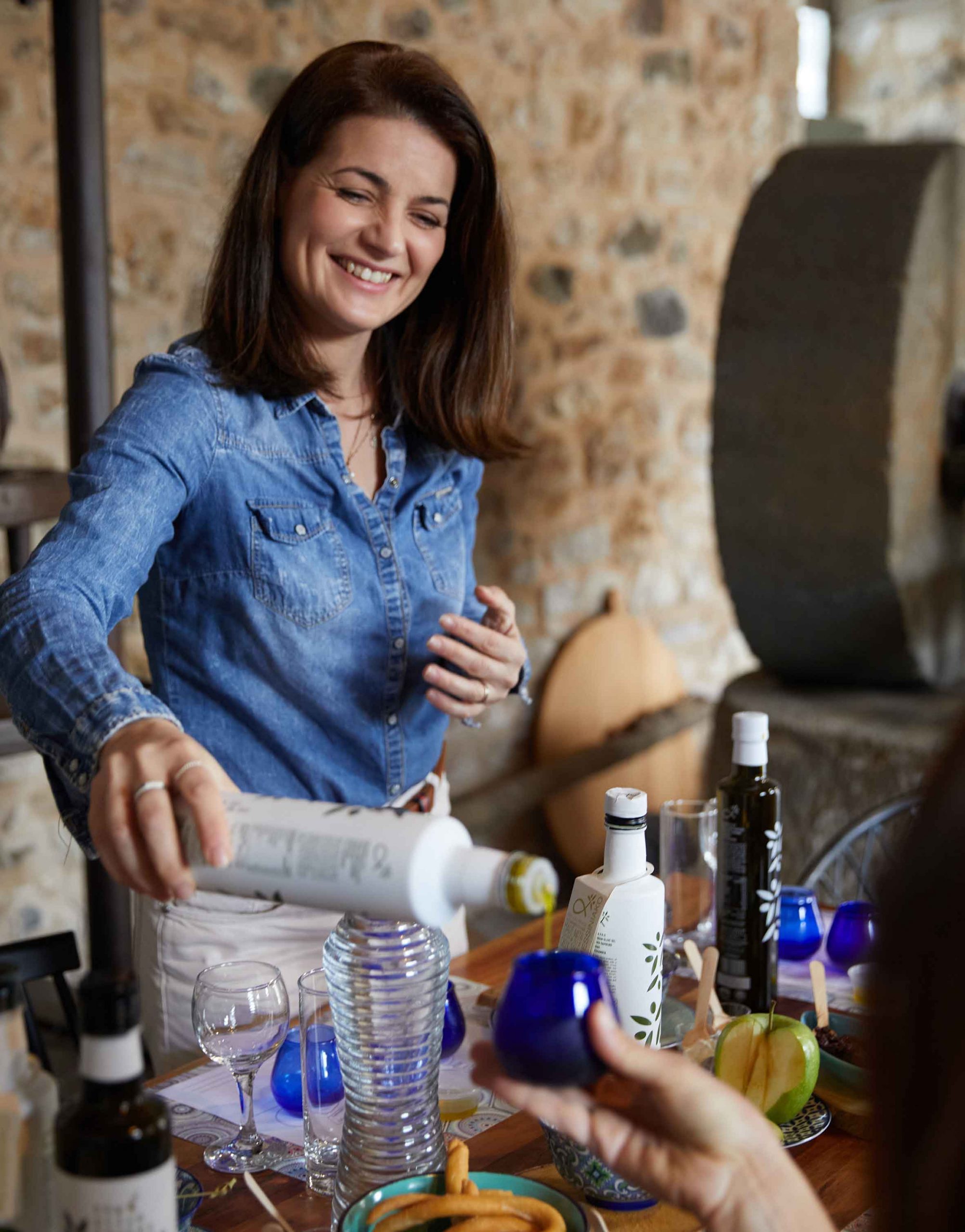
© Dimitris Vlaikos
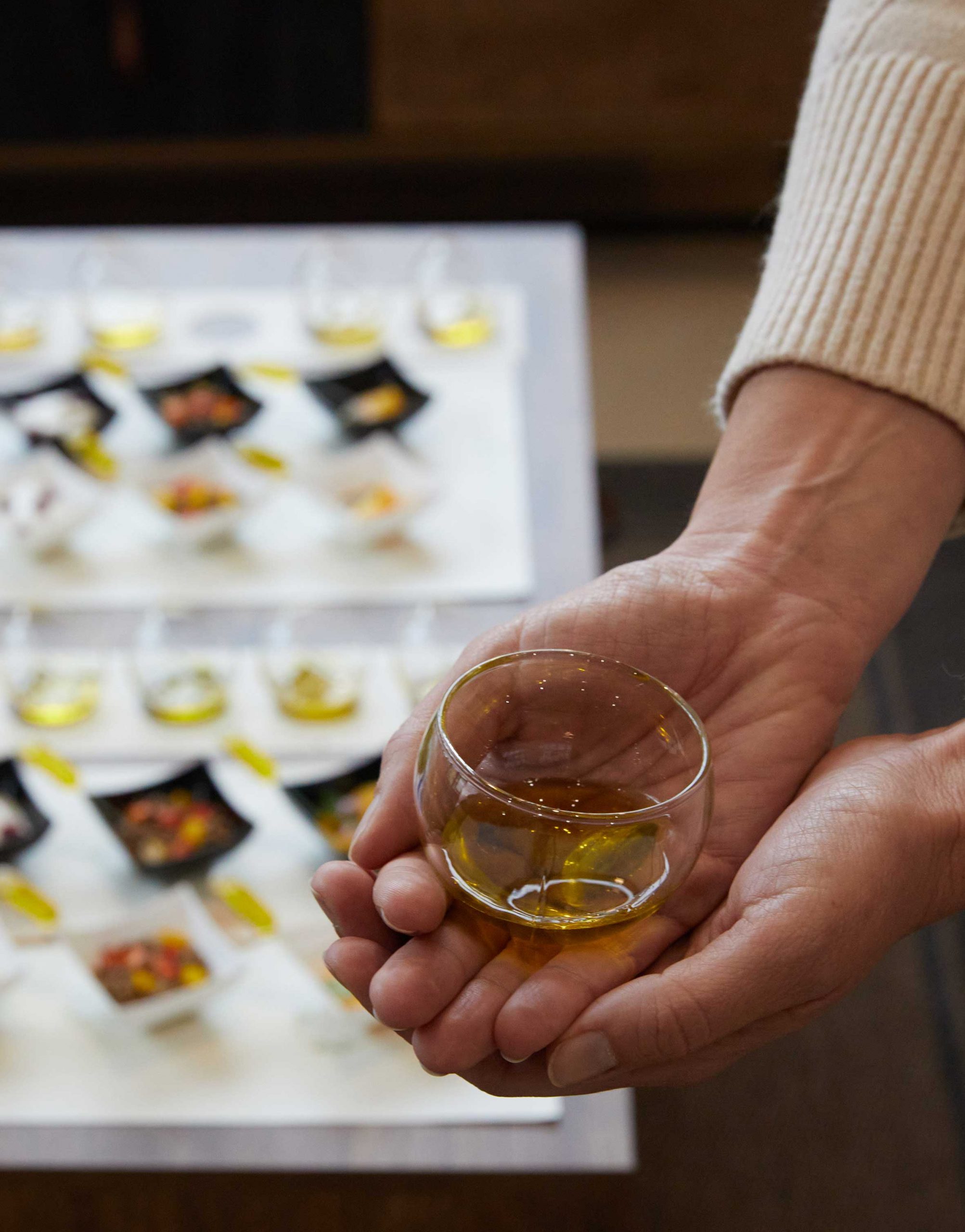
© Dimitris Vlaikos
The art of tasting
One of the most enjoyable parts of getting to know olive oil is tasting its different varieties. Costas Tsoronis, co-founder with Panagiotis Papanikolopoulos of the company Oliverse, explains that such tastings were once the preserve of professionals, but are now sought out by visitors as well. Tastings can happen in indoor settings or they can be held outdoors in olive groves. The basic equipment for professional tasting includes blue glasses for the extra virgin olive oils being served. Papanikolopoulos explains that the color blue is used so that tasters are not influenced by the color of the oil. When tastings are done for recreational purposes, however, clear glasses can be used, as there’s no need to stop tasters from enjoying the color of the product.
In the first stage of our tasting session, we’re comparing five extra virgin olive oils from different regions of Greece. First, we warm the glass in our hands and agitate the liquid to release its aromas. Next, we take a sip of the olive oil while breathing in from our mouths, sensing the floral aroma which characterises the Makri variety, the first variety we’re sampling. Then follows an assessment of its spicy and bitter elements, as Panagiotis lists the terms to describe potential flaws in taste or smell which can be present in an olive oil. The process is reminiscent of wine tasting, and wins you over sip by sip, as you begin to appreciate how sharp the differences can be between varieties.
For the food pairing, which is the second stage in our tasting, Panagiotis has prepared a series of very different dishes. We find that the lentil salad goes best with the Manaki variety, an olive oil rich in aromas, while we are charmed by the way a slice of orange sprinkled with fleur de sel brings out the aromas and spiciness of the Koroneiki variety. A traditional recipe of the Mani region, salad with orange, salt, onion and olive oil exemplifies the substance of the tasting experience for a traveler; it’s an interesting way to discover the flavors of a place through what is both a pleasant geography game and an elegant way to promote a quintessentially Greek product.
Info
Oliverse, Kalamata, Tel. (+30) 694.596.6655, Facebook: Oliverse.gr, Instagram: @oliversegr
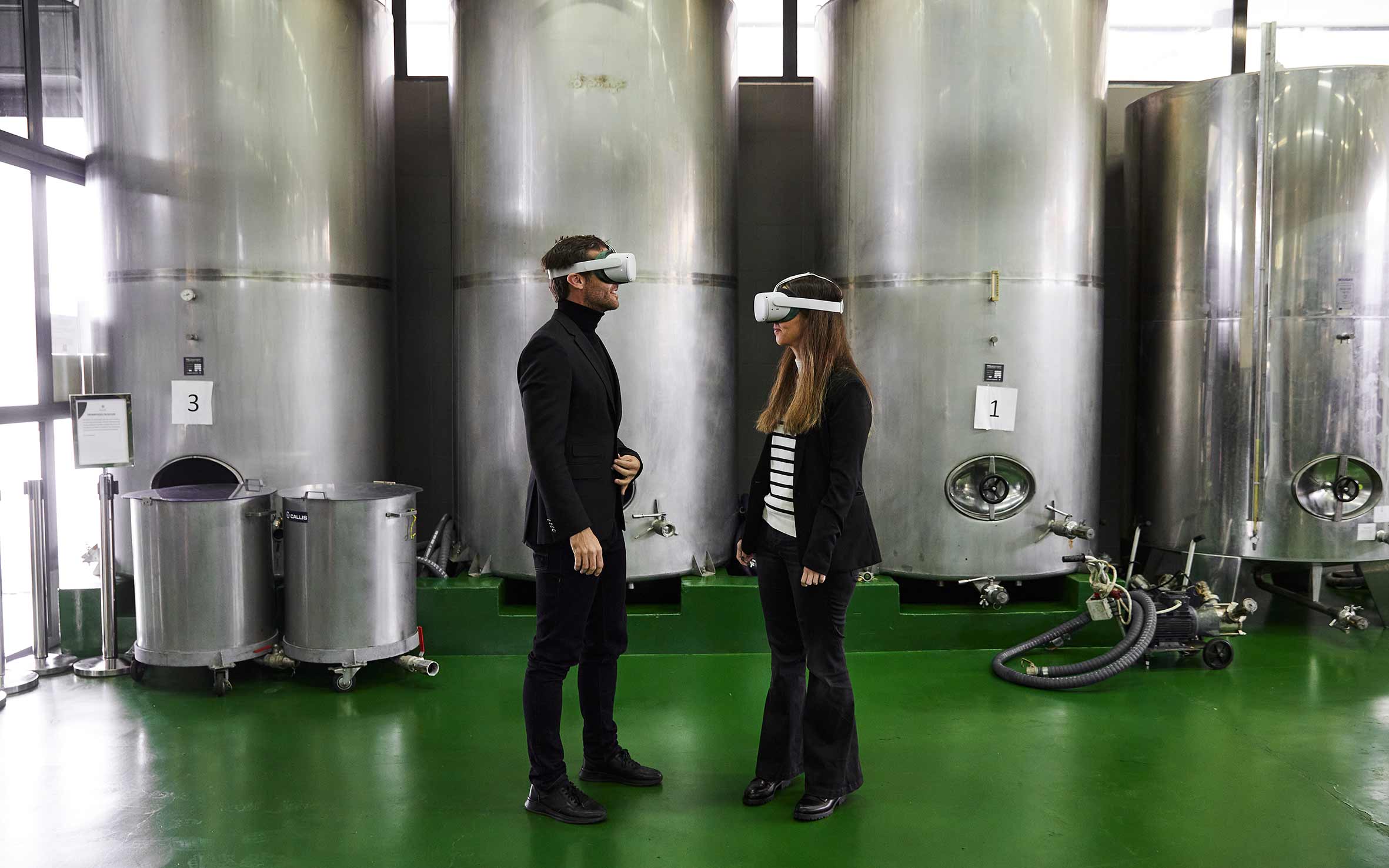
© Dimitris Vlaikos
In the age of virtual reality
The high-tech Markellos olive press in Galataki in Corinthia offers a different, more futuristic experience. Nikos Markellos represents the fourth generation of olive oil makers in his family. He and his partners have created a virtual reality tour of the oil-making process.
Wearing a VR headset, you’ll enjoy the sensation of being whisked over the nearby Corinth canal and the verdant slopes of the Solygeia region. Next, you’ll find yourself aboard a tractor in the olive grove, following the workers pruning the olive trees. This engrossing tour continues with the olive harvest, and takes in all the processes for the extraction and bottling of olive oil. In addition to the virtual tour, visitors can check out the olive press for real and take part in a tasting session.
The whole experience is already attracting groups of visitors from Europe, America and Asia. With its eyes on the future, the Markellos press is planning its next investments in technology which will differentiate them from their competition and broaden the appeal of extra virgin olive oil among the public.
Info
Markellos Olive Press, Galataki, Corinthia, Tel. (+30) 27410.333.28, markellos-olive.gr
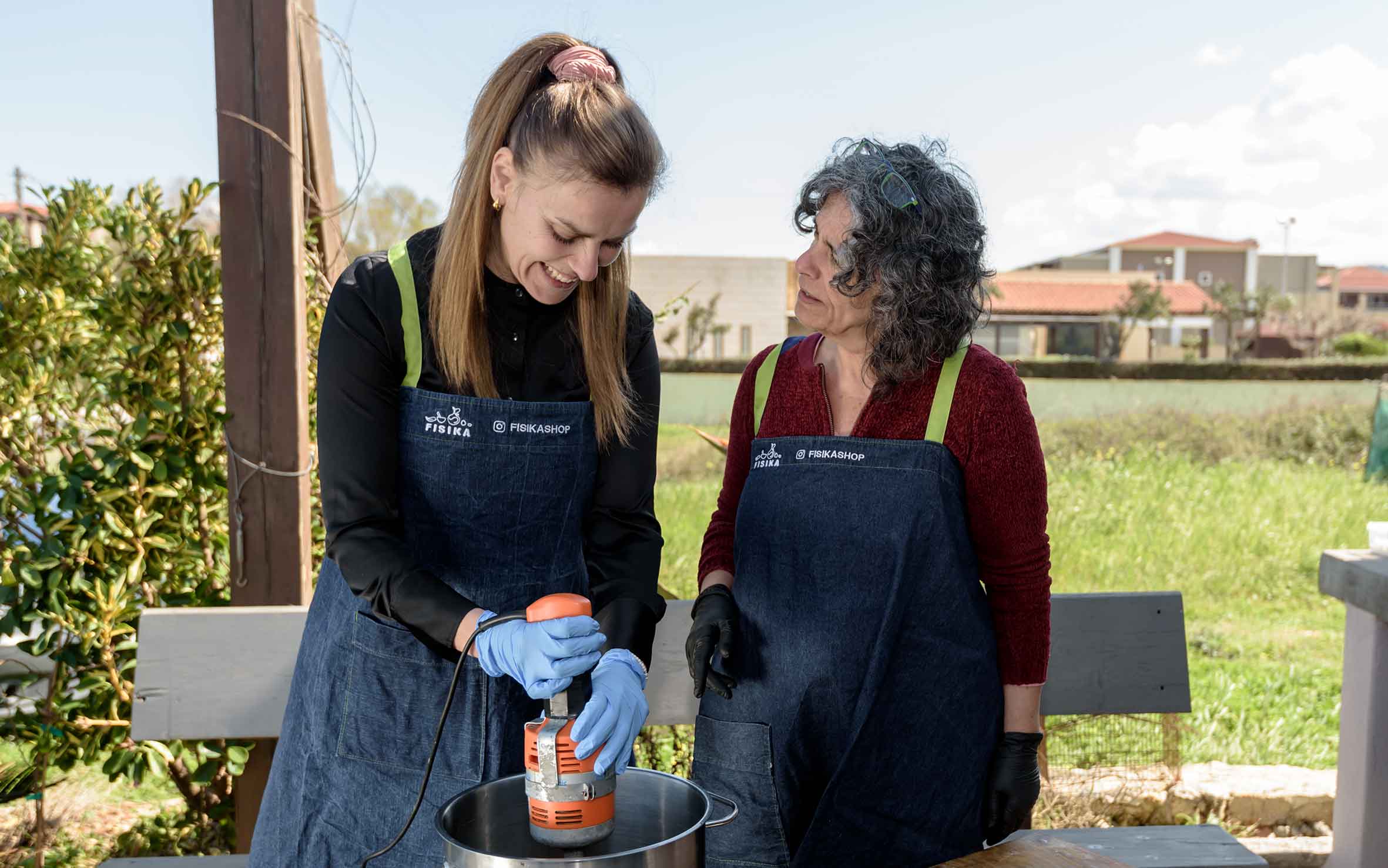
© Giannis Chatziioannou
Shall we make soap?
There are sectors where traditional ways and the charm of the artisanal continue to play a leading role. At the Fisika soap workshop in Gerani near Hania, visitors can get a close look at how soap is made from organic olive oil, and even take part in a hands-on seminar to learn basic techniques. Filio Syka learned traditional soap-making from her grandmother who, along with the other village women, made her own soap.
In the old days, housewives used a wooden spoon – and a lot of patience – to mix olive oil with caustic soda until the mixture thickened. Today, the process is a lot quicker thanks to hand mixers, but natural ingredients are still the stars. Natural additives, including rosemary, bay leaves, orange peel and olive leaves from the garden and the surrounding area, offer their own beneficial properties to the soap. Olive oil is sourced from the nearby producers in the village of Anoskeli and at Biolea’s Astrikas Estate; facilities at both locations are open to visitors.
Info
Fisika, Gerani, Hania, Tel. (+30) 28210.619.30, fisikashop.com
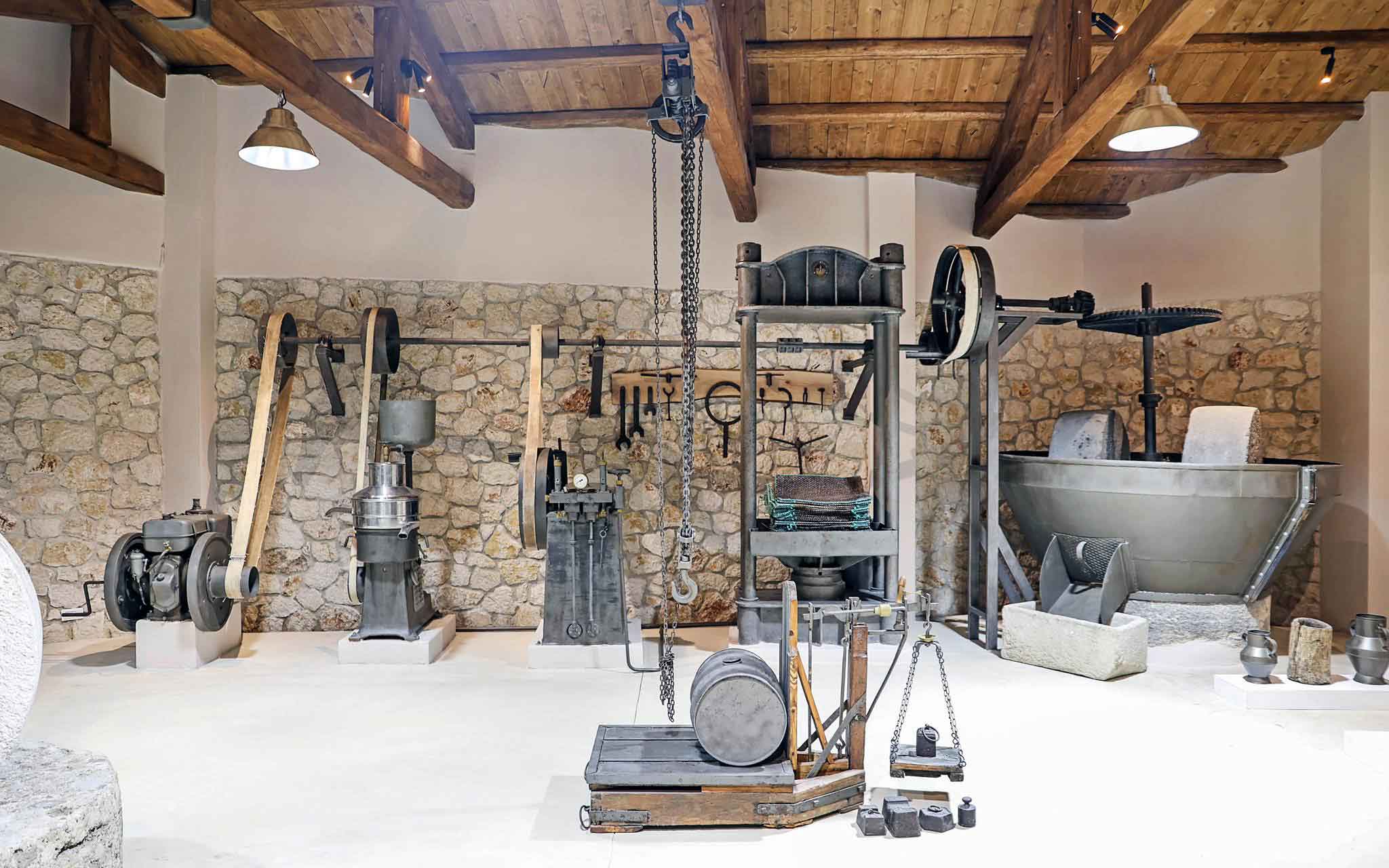
Museum tales
The long history of the olive and olive oil across all of Greece is preserved in restored historical olive presses as well as a series of museums. One of the pioneers in olive-related museums is the Cultural Foundation of Piraeus Bank. The Museum of the Olive and Greek Olive Oil in Sparta records the history of olive oil from prehistoric times up until the early 20th century. Its exhibits include fossilised 50,000-year-old olive leaves and exact replicas of prehistoric, Hellenistic and Byzantine olive presses. The Museum of Industrial Oil Production on Lesvos, housed in the old co-operative olive press in Agia Paraskevi, presents the industrial phases of olive oil production in Greece, with meticulously restored machinery which is fully functional.
A new Museum of the Olive is about to open in Vistonas on the island of Corfu in April. The initiative belongs to the Konstantis family, which has been involved with olives since the early 19th century. The museum displays, designed by the Ionian University, includes numerous artifacts associated with the care of olive groves, oil-making, and storage. Among them is a carved stone storage tank dating to 1896. The display stresses the connection between the objects in the collection and the everyday lives of the people involved in olive oil making, as well as the importance of the olive to the island of Corfu.
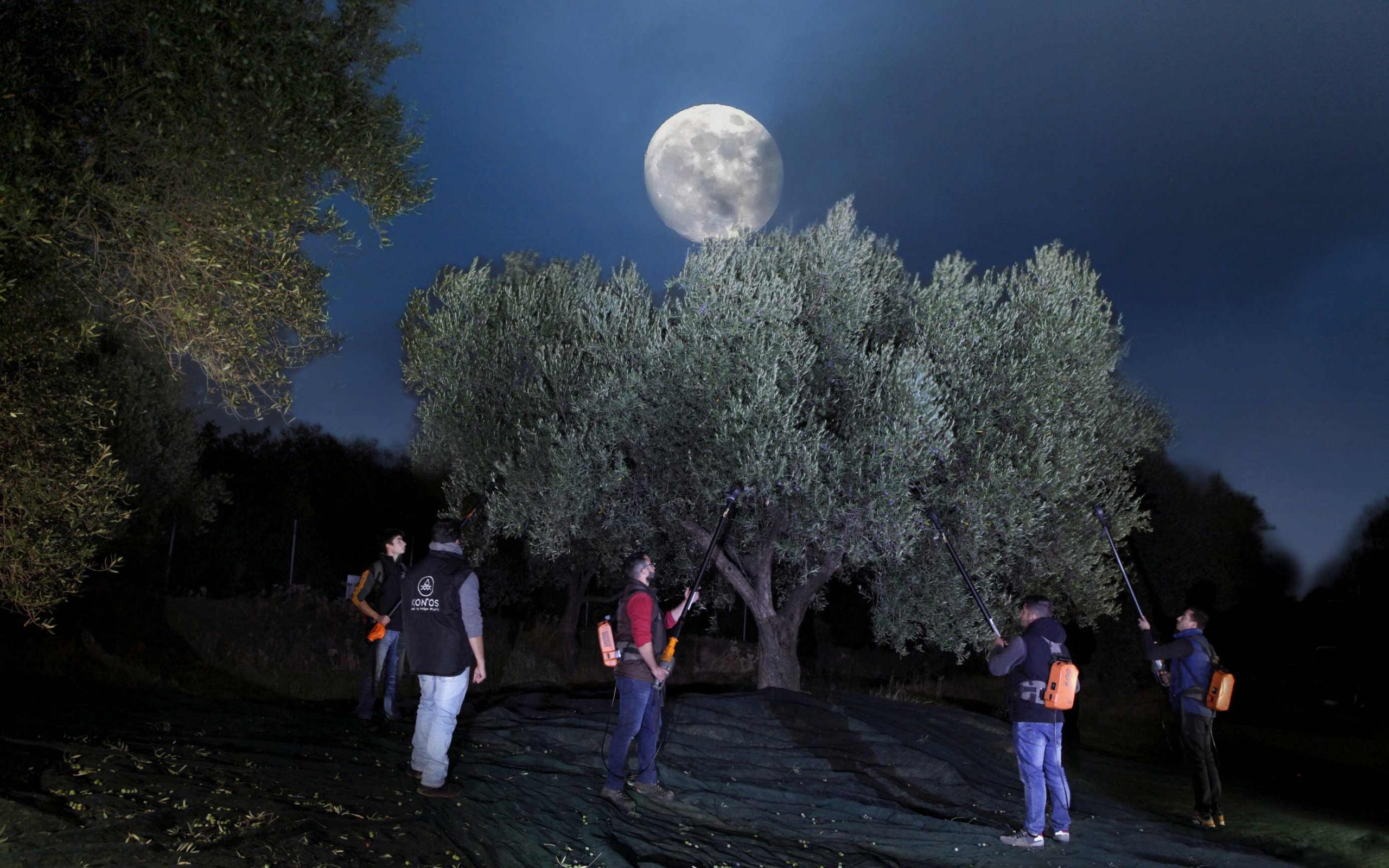
Three more outstanding experiences
1, Wine as well as olive oil
Olive oil tasting has much in common with wine tasting, and there are many places in Greece where the two experiences can be combined. Among them, Moni Toplou in Sitia (tel. 28430-61226) is particularly notable. The wine and olive oil tasting sessions take place in the atmospheric grounds of a historic monastery.
2, Olive leaf therapy
More and more spas are reviving the ancient tradition of treatments based on olive oil. The olive therapies offered by AnazoeSpe at Costa Navarino (costanavarino.com) have their origins in inscriptions found at the Palace of Nestor, and include facials using sweet-lemon flower extract, sage and olive leaves, as well as massages given in groves with thousand-year-old olive trees.
3, Night-time harvest
Some of the first olive experiences to be offered in Greece involved agritourism facilities and harvesting in olive groves, which takes place between November and February. One of the most unusual activities of this kind is the night-time harvest, which takes place at the Michelis Estate (konoshill.com) in Makri, near Alexandroupoli, during the October full moon.

